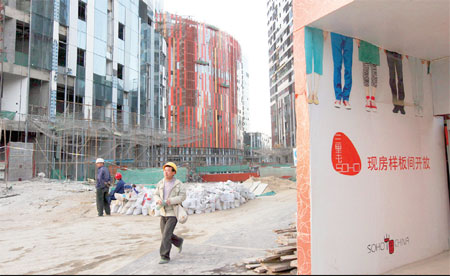Soho China first-half profit surges 136 times
Updated: 2010-08-26 10:36
By Emma An(HK Edition)
|
|||||||||
|
A construction worker walks by Soho China Ltd's residential and commercial Sanlitun SOHO complex in Beijing last October. The property developer said Wednesday its 1st-half net profit skyrocketed 136 times year-on-year.Doug Kanter / Bloomberg News |
The mainland property market will continue to go downhill in the second half of 2010 as supply increases in response to the latest government policies, SOHO China chairman Pan Shiyi said after the mainland developer reported net profits surged 136 times in the first half to 1.72 billion yuan.
Despite the depressed state of the property market, SOHO China reported record high revenue of 8.66 billion yuan for the first half ended June, exceeding that achieved for the entire 2009. Its contracted sales for the period totaled at 13.57 billion yuan, hitting 75 percent of its full-year sales target of 18 billion yuan.
"The property market is having a hard time, but the remainder of the year probably will see it go even worse," Pan said at a press briefing, suggesting that the residential market will be hit harder.
"The second half is going to see a further slide in prices and sales of residential properties mainly because of an increased supply," Pan said.
He noted that investment in the country's property market grew by 38.1 percent in the first half.

"This growth rate is unprecedented in the history of the country's property market, and will translate into enlarged housing supply and therefore downward prices," Pan added.
The increased supply is a result of government initiatives to slow down soaring residential market prices, Pan said.
For one thing, government support for more low-cost housing supply will exert downward pressure on prices of regular housing, Pan said.
"Increasing low-cost supply has been talked about for quite some time, but it had remained a lip service until this April when the government began to make real efforts to address the problem," Pan said.
The April policy requires that 50 percent of all new lands supplied thereafter be used for low-cost housing construction.
For another, the government policy to clean up land held by developers will also contribute to increased housing supply.
Developers, fearing that the government will take back land, will have to speed up construction, Pan said.
He cautioned that the barriers the government has set on bank loans for real estate developments and the imminent government policy to restrict the use by developers of their pre-sale proceeds will further tighten the liquidity of developers.
"Normally, the pre-sale proceeds account for 50 percent of developers' working capital, but this policy will turn this part of working capital unworkable," Pan said.
Looking ahead, Pan said that the company will, as ever, stay away from the residential market, easily subject to regulations, and will stick to developing commercial properties in the most prosperous areas of Beijing and Shanghai.
China Daily
(HK Edition 08/26/2010 page3)
